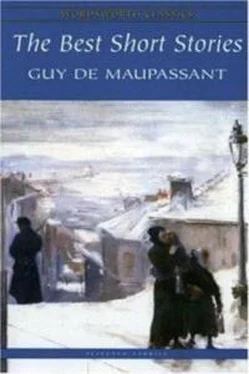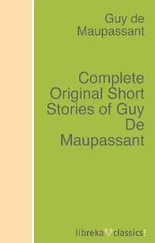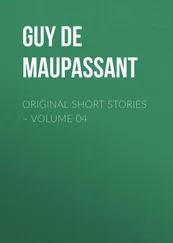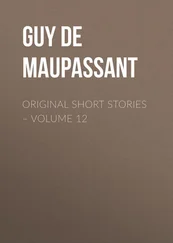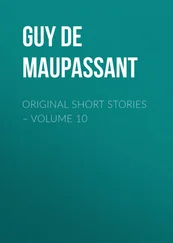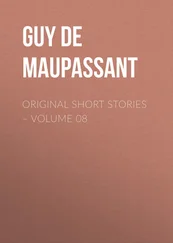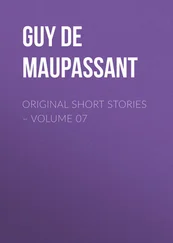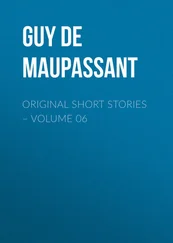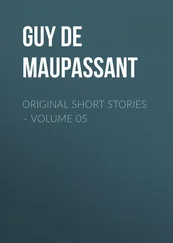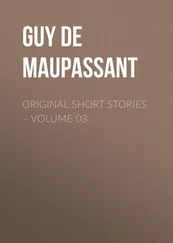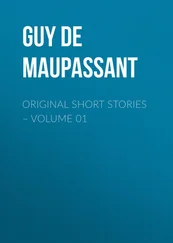"Why didn't you bring it with you?" asked the man.
"Because, sister, from now on I sell from where I stand. Plenty of people will buy. All you have to do is to take a walk over there, find the thing and take it. No risk for me."
The innkeeper, growing suspicious, exclaimed "Supposing he wasn't there!"
Labouise once more raised his hand and said:
"He's there, I swear!—first bush to the left. What it is, I don't know. But it's not a buck, I'm positive. It's for you to find out what it is. Twenty–five francs, cash down!"
Still the man hesitated: "Couldn't you bring it?"
Maillochon exclaimed: "No, indeed! You know our price! Take it or leave it!"
The dealer decided: "It's a bargain for twenty francs!"
And they shook hands over the deal.
Then he took out four big five–franc pieces from the cash drawer, and the two friends pocketed the money. Labouise arose, emptied his glass and left. As he was disappearing in the shadows he turned round to exclaim: "It isn't a buck. I don't know what it is!—but it's there. I'll give you back your money if you find nothing!"
And he disappeared in the darkness. Maillochon, who was following him, kept punching him in the back to express his joy.
As we were still talking about Pranzini, M. Maloureau, who had been attorney general under the Empire, said: "Oh! I formerly knew a very curious affair, curious for several reasons, as you will see.
"I was at that time imperial attorney in one of the provinces. I had to take up the case which has remained famous under the name of the Moiron case.
"Monsieur Moiron, who was a teacher in the north of France, enjoyed an excellent reputation throughout the whole country. He was a person of intelligence, quiet, very religious, a little taciturn; he had married in the district of Boislinot, where he exercised his profession. He had had three children, who had died of consumption, one after the other. From this time he seemed to bestow upon the youngsters confided to his care all the tenderness of his heart. With his own money he bought toys for his best scholars and for the good boys; he gave them little dinners and stuffed them with delicacies, candy and cakes: Everybody loved this good man with his big heart, when suddenly five of his pupils died, in a strange manner, one after the other. It was supposed that there was an epidemic due to the condition of the water, resulting from drought; they looked for the causes without being able to discover them, the more so that the symptoms were so peculiar. The children seemed to be attacked by a feeling of lassitude; they would not eat, they complained of pains in their stomachs, dragged along for a short time, and died in frightful suffering.
"A post–mortem examination was held over the last one, but nothing was discovered. The vitals were sent to Paris and analyzed, and they revealed the presence of no toxic substance.
"For a year nothing new developed; then two little boys, the best scholars in the class, Moiron's favorites, died within four days of each other. An examination of the bodies was again ordered, and in both of them were discovered tiny fragments of crushed glass. The conclusion arrived at was that the two youngsters must imprudently have eaten from some carelessly cleaned receptacle. A glass broken over a pail of milk could have produced this frightful accident, and the affair would have been pushed no further if Moiron's servant had not been taken sick at this time. The physician who was called in noticed the same symptoms he had seen in the children. He questioned her and obtained the admission that she had stolen and eaten some candies that had been bought by the teacher for his scholars.
"On an order from the court the schoolhouse was searched, and a closet was found which was full of toys and dainties destined for the children. Almost all these delicacies contained bits of crushed glass or pieces of broken needles!
"Moiron was immediately arrested; but he seemed so astonished and indignant at the suspicion hanging over him that he was almost released. How ever, indications of his guilt kept appearing, and baffled in my mind my first conviction, based on his excellent reputation, on his whole life, on the complete absence of any motive for such a crime.
"Why should this good, simple, religious man have killed little children, and the very children whom he seemed to love the most, whom he spoiled and stuffed with sweet things, for whom he spent half his salary in buying toys and bonbons?
"One must consider him insane to believe him guilty of this act. Now, Moiron seemed so normal, so quiet, so rational and sensible that it seemed impossible to adjudge him insane.
"However, the proofs kept growing! In none of the candies that were bought at the places where the schoolmaster secured his provisions could the slightest trace of anything suspicious be found.
"He then insisted that an unknown enemy must have opened his cupboard with a false key in order to introduce the glass and the needles into the eatables. And he made up a whole story of an inheritance dependent on the death of a child, determined on and sought by some peasant, and promoted thus by casting suspicions on the schoolmaster. This brute, he claimed, did not care about the other children who were forced to die as well.
"The story was possible. The man appeared to be so sure of himself and in such despair that we should undoubtedly have acquitted him, notwithstanding the charges against him, if two crushing discoveries had not been made, one after the other.
"The first one was a snuffbox full of crushed glass; his own snuffbox, hidden in the desk where he kept his money!
"He explained this new find in an acceptable manner, as the ruse of the real unknown criminal. But a mercer from Saint–Marlouf came to the presiding judge and said that a gentleman had several times come to his store to buy some needles; and he always asked for the thinnest needles he could find, and would break them to see whether they pleased him. The man was brought forward in the presence of a dozen or more persons, and immediately recognized Moiron. The inquest revealed that the schoolmaster had indeed gone into Saint–Marlouf on the days mentioned by the tradesman.
"I will pass over the terrible testimony of children on the choice of dainties and the care which he took to have them eat the things in his presence, and to remove the slightest traces.
"Public indignation demanded capital punishment, and it became more and more insistent, overturning all objections.
"Moiron was condemned to death, and his appeal was rejected. Nothing was left for him but the imperial pardon. I knew through my father that the emperor would not grant it.
"One morning, as I was working in my study, the visit of the prison almoner was announced. He was an old priest who knew men well and understood the habits of criminals. He seemed troubled, ill at ease, nervous. After talking for a few minutes about one thing and another, he arose and said suddenly: 'If Moiron is executed, monsieur, you will have put an innocent man to death.'
"Then he left without bowing, leaving me behind with the deep impression made by his words. He had pronounced them in such a sincere and solemn manner, opening those lips, closed and sealed by the secret of confession, in order to save a life.
"An hour later I left for Paris, and my father immediately asked that I be granted an audience with the emperor.
"The following day I was received. His majesty was working in a little reception room when we were introduced. I described the whole case, and I was just telling about the priest's visit when a door opened behind the sovereign's chair and the empress, who supposed he was alone, appeared. His majesty, Napoleon, consulted her. As soon as she had heard the matter, she exclaimed: 'This man must be pardoned. He must, since he is innocent.'
Читать дальше
